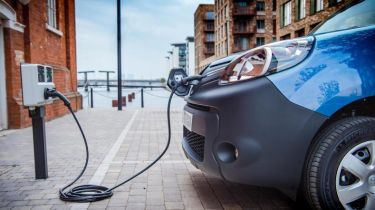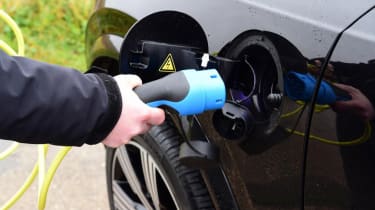The UK Workplace Charging Scheme grant explained
All you need to know about charging-point installation grants for businesses in the UK – and how to apply for them

Companies all across the country are contemplating the switch to electric vehicles, whether to fulfil direct business needs in the cleanest possible way, or simply because they wish to be good corporate citizens and encourage staff to reduce their commuting carbon emissions.
So whether you’re looking to run a fleet of electric vans for local deliveries, or want to offer employees the chance to recharge their cars in your office car park as a tax-free perk, the Workplace Charging Scheme (WCS) can save your company a lot of cash when it comes to charging point installation costs.
Workplace Charging Scheme eligibility
The WCS has been implemented to address arguably the biggest challenge to any business making the switch to electric vehicles, which is the infrastructure investment required to meet present and predicted charging needs.
Run by the Office of Zero Emissions Vehicles (OZEV; formerly OLEV), the WCS enables companies to apply for vouchers to help fund the installation of charging points on commercial premises only. If you meet the application criteria, your business can claim up to 75% of the purchase and installation costs, capped at £350 per charging outlet/socket, and limited to 40 sockets per applicant.
Eligible organisations include businesses registered with HMRC, as well as charities and public-sector organisations, which either need electric-car charging facilities now, or intend to encourage electric-vehicle uptake among staff or fleet users. Applicants must have off-street parking, and while it’s possible to claim across multiple business locations to reach the 40-socket limit, each location must be company-owned, or a business must be able to demonstrate landlord consent for installation.
Types of charger covered by the WCS now extend from basic 3.5kW wallboxes up to 22kW fast-charging units, and each proposed socket must have its own accessible parking space. Rapid chargers operating at outputs above 22kW are excluded, but otherwise the criteria are deliberately very inclusive, as OZEV seeks to encourage electric vehicle take-up nationally.

How to apply for the Workplace Charging Scheme
Applications for WCS vouchers can be made through a service portal on the gov.uk website, and vouchers are issued as digital codes that can be ‘spent’ with your chosen installer.
Vouchers cannot be claimed retrospectively for charging facilities already installed and vouchers are valid for 180 days. If they've not been used – or installation work has begun but not been completed – within this period, the vouchers expire and a new WCS application must be made. Multiple applications may be made over time, as long as the total of installations claimed for doesn’t exceed the 40-sockets-per-business limit.
Each application must include evidence of eligibility, details of sites where installations are planned and a declaration about conditions of use for the charging point. If successful, vouchers will be issued detailing the site locations, number of sockets and expiry date for each individual application.
How to use Workplace Charging Scheme vouchers
Once you've successfully completed an application, it's simply a matter of forwarding your voucher code to your chosen installer. They must be OZEV-approved; a list of accredited installers is available on the OZEV website.
Your installer will check the code validity and submit it to OZEV on completion of the installation. The OZEV portal will calculate 75% of the installation cost (capped at £350 per socket as outlined above) and the installer must provide photographic evidence of the completed installation as well as confirming technical and safety standards have been met.
OZEV will confirm with the applicant that the works have been completed and the grant will be paid directly to the installer. Installers are not permitted to ask businesses to make any advance payments against installation vouchers, but the balance of the installation cost will be invoiced in the normal way.

Company-car charging at home
"Can I claim for charging my company car at home?" is one of the first questions new electric-car users are likely to ask, and of course any employee wishing to do that will need home-based charging facilities on top of what may be supported through the WCS on company premises.
If a firm is already supplying charging facilities at the workplace, then additional home charging points may be considered unnecessary from a business point of view. However, companies can choose to pay for charging points to be installed at employees' homes regardless of the business case, and if they’re proposing to switch employees' company cars from traditional fuels to electric power, then many employees might reasonably expect such support.
Any firms not wishing to cover the cost of home chargers can still support employees by offering interest-free loans to those wanting home charge points, and recouping the loans via a monthly salary deduction – much like a railway season-ticket loan.
The Electric Vehicle Homecharge Scheme
While the WCS isn't relevant for installations off company premises, the cost to employees and/or employers of installing a charging point at home can be reduced using the Electric Vehicle Homecharge Scheme (EVHS). This consists of a grant (capped at £350) to homeowners, which covers up to 75% of the cost of a home charging point installation.
It means businesses supporting employees by paying for home installations need not be exposed to the full market cost, and typically your WCS installer will be able to provide advice and information for those wishing to access the grants. A recent RAC report put the average cost of a home charger at £800, leaving the homeowner – or employer – with £450 to pay.
It’s important to note that paying for an employee’s home-charger installation and/or covering the cost of electricity used at home for charging a company car doesn't impose any BiK tax liability on affected employees. Neither is there any National Insurance Contribution liability for employers. That’s because charging equipment and the electricity used by company vehicles – even for private mileage – are not currently considered a taxable benefit as long as electricity payments don’t exceed the 4p/mile set out in HMRC's Advisory Fuel Rates.